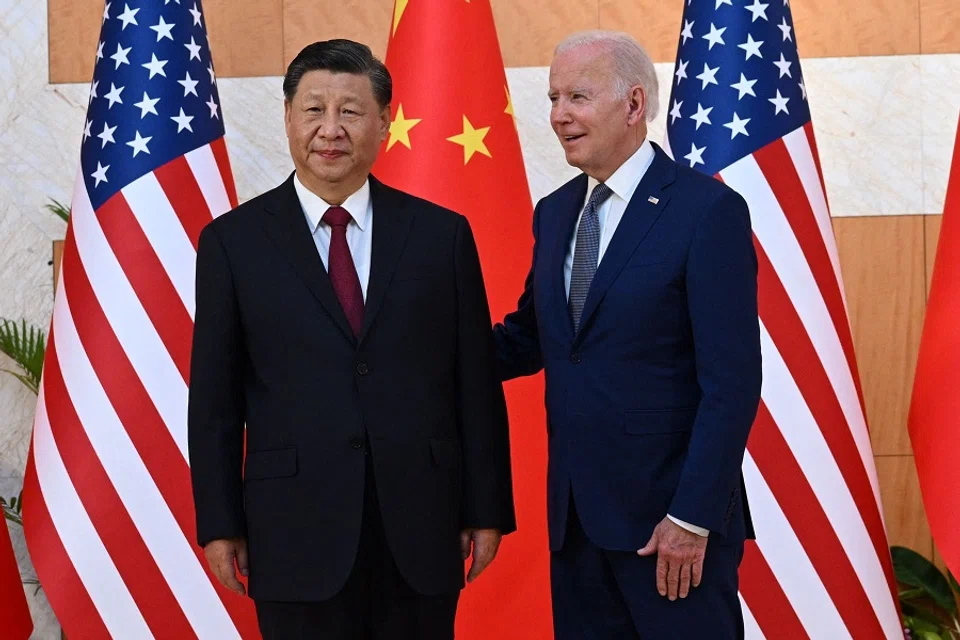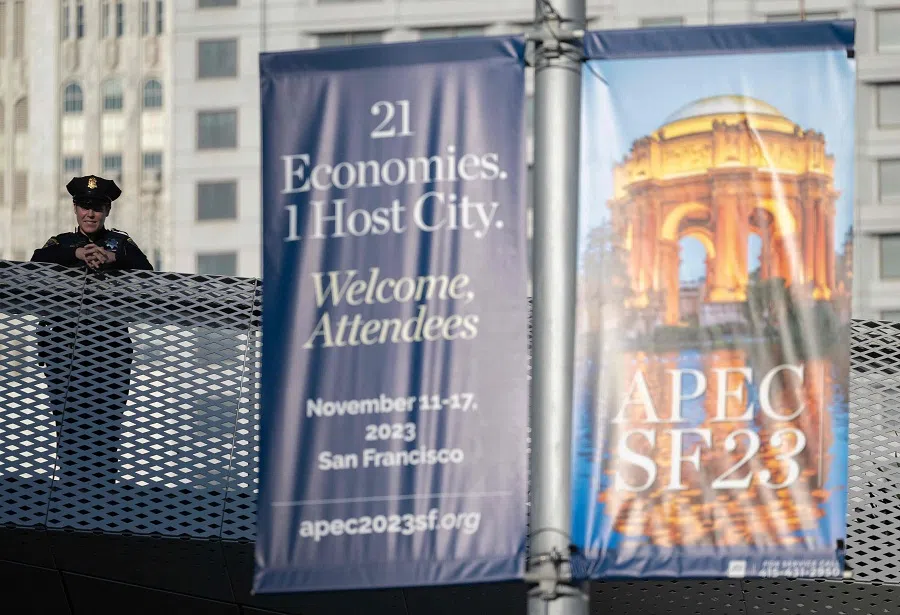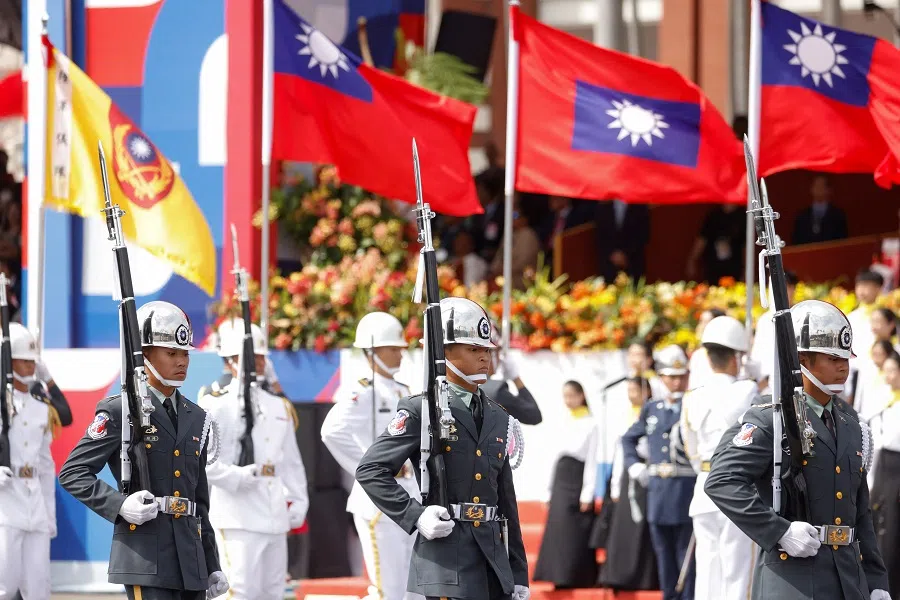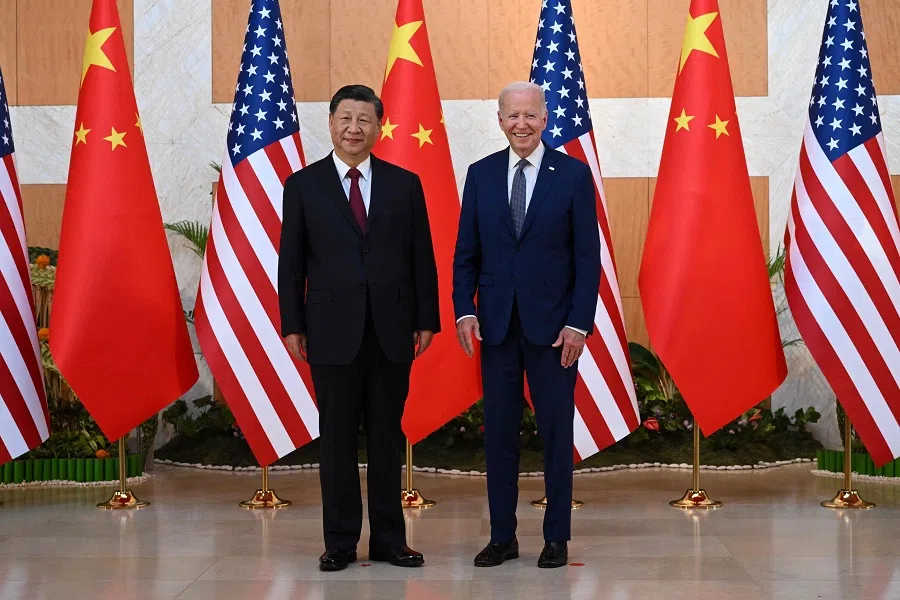What will Xi Jinping and Joe Biden talk about?
Chinese President Xi Jinping and US President Joe Biden are set to meet in San Francisco. What is likely to be on the agenda, and what results can be expected? Lianhe Zaobao correspondent Yu Zeyuan analyses the possibilities.

Following months of back-and-forth between senior Chinese and American officials, Chinese President Xi Jinping and US President Joe Biden will finally meet in San Francisco. This will be their second in-person meeting since Biden took office, and many are watching to see if the meeting will stabilise China-US relations.
When Xi and Biden last met on 14 November 2022 in Bali, Indonesia, the US assured China of "Five Nos", namely that it would not seek to change China's system, not seek a new Cold War, not seek to revitalise alliances against China, not support "Taiwan independence", and not support "two Chinas" or "one China, one Taiwan". It also expressed "four no-intentions", that it had no intention to have a conflict with China, seek decoupling from China, halt China's economic development or contain China.
On its part, China also made a commitment to the US that it does not seek to change the existing international order or interfere in the internal affairs of the US, and has no intention to challenge or displace the US.
However, the state of China-US relations over the past year shows that both sides have levelled accusations against one another, and hostility has not decreased but increased. The US continues to see China as its top strategic competitor and has contained and suppressed China on the Taiwan issue, technology, and economy and trade. China also believes that the US has not kept its word and that its promises to China are but "strategic deception".
Likely topics of discussion
On the other hand, while it is difficult to change the general trend of China-US rivalry, both sides are also well aware that it is tough to crush the other side through confrontation - there must be communication and cooperation as well, otherwise their own interests will be jeopardised. Over the past few months, China and the US have shown goodwill through a series of high-level exchanges, and have finally confirmed the second meeting in San Francisco.
From a macro perspective, China hopes that both countries will adhere to the three principles of mutual respect, peaceful coexistence and win-win cooperation...

According to China's foreign ministry, the meeting will focus on in-depth communication on issues of strategic, overarching and fundamental importance in shaping China-US relations and major issues concerning world peace and development. The White House also stated that the meeting between both heads of state seeks to stabilise bilateral relations and ensure that channels of communication are open.
Issues of "strategic, overarching and fundamental importance" refer to China's consistent emphasis that head-of-state diplomacy should play an irreplaceable strategic role in growing bilateral ties.
From a macro perspective, China hopes that both countries will adhere to the three principles of mutual respect, peaceful coexistence and win-win cooperation, and continue to explore and establish guiding principles or a strategic framework for China-US relations through the head-of-state dialogue, effectively managing differences, enhancing strategic mutual trust, and reducing economic and trade frictions through a series of dialogue mechanisms to put the consensus reached by the two heads of state into practice.
At the same time, it also hopes that cultural exchanges and exchanges among local communities and the masses can be revitalised so as to fulfil what Chinese Foreign Minister Wang Yi called "returning to Bali and heading towards San Francisco", stabilising China-US relations and facilitating the return of bilateral relations to the track of healthy and stable development.
The Taiwan issue
On specific issues, Xi is still most concerned with the Taiwan issue. Taiwan's presidential elections are fast approaching, and although the situation is not completely clear, it is highly likely that Democratic Progressive Party presidential candidate William Lai Ching-te, who has always advocated "Taiwan independence", will win. If Lai gets elected, it could bring new challenges to the situation in the Taiwan Strait and even force the mainland to significantly adjust its Taiwan policy. Beijing has no choice but to make preparations.

Xi is expected to raise the crucial issue of Taiwan with Biden, stressing China's bottom line with regard to its policy towards Taiwan, clearly stating that "Taiwan independence" could result in a drastic change in the situation in the Taiwan Strait, and explicitly asking the US to reaffirm its "one China" policy and not support "Taiwan independence" or "one China, one Taiwan", in a bid to rope the US into jointly drawing a red line for "Taiwan independence".
But just because the US does not support "Taiwan independence", it does not mean it supports the reunification of China.
In principle, Biden also hopes to stabilise China-US relations, and will reaffirm US commitments, including that the US does not wish to "decouple" from China, and does not intend to impede China's development. As for the Taiwan issue that China is most concerned about, the US naturally does not wish for war in the Taiwan Strait, or there is a risk that it would be drawn into a direct military conflict with China. It is expected that Biden will reaffirm the US' "one-China policy" and not support "Taiwan independence".
But just because the US does not support "Taiwan independence", it does not mean it supports the reunification of China. In recent years, the US has become more and more adept at balancing between not supporting "Taiwan independence" and supporting Taiwan in opposing China, frequently using the Taiwan card to bargain with China, and benefiting from this. So, even if Biden reasserts that the US does not support "Taiwan independence", the US would not give up playing the Taiwan card in the future whenever the opportunity arises.
...Biden would ask that China not provide military or other forms of aid to Russia; on the Israel-Hamas conflict, it would ask China to play a role that would be beneficial towards the US and Israel.
Other issues of discussion
At the same time, the US would place more emphasis on China's expansion of market access, preventing fentanyl from entering the US, restoring communication mechanisms between the US and Chinese militaries so as to avoid both militaries clashing over the Taiwan Strait, South China Sea and other areas due to misjudgements and accidents, and making progress on other concrete issues. Biden is expected to raise the US's requests during the meeting.
Of course, Xi would also raise issues with Biden, such as the US sanctions against Chinese businesses, export restrictions to China and US tariffs on China.
In terms of international affairs, Biden would ask that China not provide military or other forms of aid to Russia; on the Israel-Hamas conflict, it would ask China to play a role that would be beneficial towards the US and Israel. Xi would likely reassert China's stance on the basis of impartiality and peace, and hope that the Russia-Ukraine war and the Israel-Hamas conflict end as soon as possible.

The meeting could also lead to a consensus with regard to a resumption of dialogue between the Chinese and US militaries, so as to avoid any accidents between the two arising from a lack of communication.
...what comes out of it would depend on what both sides talk about, and even more on what actions both sides take thereafter.
Little optimism?
From 8 to 12 November, China's Vice-Premier He Lifeng visited the US. According to the Chinese, He's visit was to make preparations for economic outcomes for the Xi-Biden summit. These include having both sides agree on intensifying communication in order to work toward common solutions, addressing disagreements where possible, and avoiding misperceptions contributing to unintended escalations.
Leaders of both sides also committed to continued direct bilateral communication between them on a regular cadence. In addition, both sides agreed on developing a healthy economic relationship that provides a level playing field for companies and workers in both countries and benefits the two peoples. Both sides further committed to work together on shared challenges, including economic growth and financial stability and regulatory issues. They also agreed to work together on climate change-related economic issues and on debt issues in low-income and emerging economies. Finally, both countries also committed to strengthening the international financial architecture, including the acceleration of efforts to evolve the Multilateral Development Banks to become better, bigger, and more effective.
From the look of things currently, both China and the US are well prepared for the meeting. However, what comes out of it would depend on what both sides talk about, and even more on what actions both sides take thereafter. After all, there is little reason for optimism for China-US relations in the upcoming year based on the outcomes of the past talks.
This article was first published in Lianhe Zaobao as ""习拜会"主要谈什么?".





